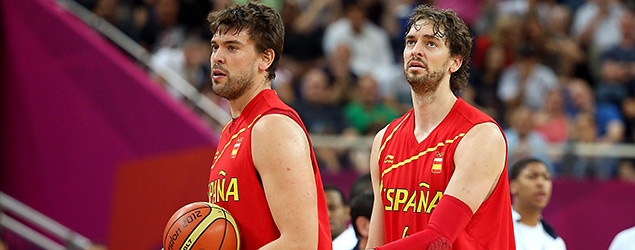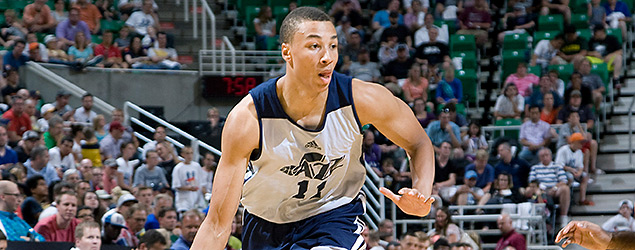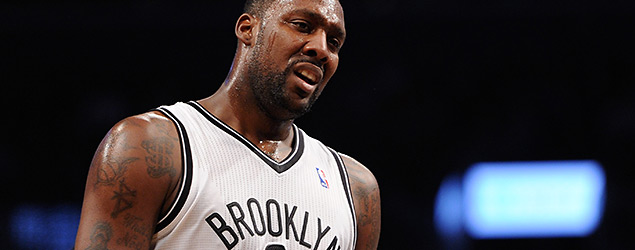The FIBA Basketball World Cup — known as the FIBA World Championship from 1950 until 2010 — is arguably the most intense international basketball competition in the world. And, based on the strong play during the qualifying rounds, the world can’t wait for #Spain2014.
Host team Spain — led by the Gasol brothers — captured the silver medal in the last two Olympic Games, losing both times to the United States. The Spaniards, ranked No. 2 in FIBA, will look to their home crowd to push them to their second world title, and they could likely see the top-ranked Americans in the championship game on Sept. 14.
Spain took home the FIBA gold in 2006 in Tokyo, the same tournament the last time Team USA lost an international competition.
Here’s a look at the 24 teams that will compete in Spain and where they currently rank in the world:
United States (ranked No. 1) — Team USA earned an automatic berth to the World Cup by winning the gold medal in the 2012 London Olympics. As usual, Team USA will be prohibitive favorites to win the gold medal — and it would be a monumental upset if they don’t. USA Basketball president Jerry Colangelo and head coach Mike Krzyzewski have dealt with withdrawals and a devastating injury to NBA All-Star Paul George this summer. The group Coach K brings to Spain won’t be as strong as his 2012 and 2008 teams, but don’t tell that to Anthony Davis, James Harden, Stephen Curry and Derrick Rose. Curry and Rose were on the 2010 World Cup team that took home the gold, while Harden and Davis played for Coach K in the 2012 Olympics. Those four stars will be asked to step into the vacuum vacated by Kobe Bryant, LeBron James, Dwyane Wade and Carmelo Anthony.
Spain (No. 2) — The Spaniards are the biggest threat to the U.S., and they will have an entire nation behind them. Injuries are a concern for head coach Juan Antonio Orenga. Pau Gasol, the cornerstone of the program for a decade, is dealing with tendonitis on both knees and point guard Ricky Rubio is coming off ACL surgery. Rubio came back to play in the 2013 EuroBasket and he appears to be close to 100%. The good news for Spain is that Rudy Fernandez looks rejuvinated, and Marc Gasol seems to embrace the leadership role. Pau and Marc anchor a formidable frontline that also boasts the NBA’s leading shot blocker in Oklahoma City Thunder power forward Serge Ibaka. Jose Calderon and Juan Carlos Navarro are a bit past their prime, but they’re still considered two of the best guards in the world.
Argentina (No. 3) — Manu Ginobili decided not to participate in this year’s World Cup, which is a huge blow to the Argentines. Ginobili is coming off minor knee surgery, and the San Antonio Spurs would rather see him rest his knee this offseason. Without the Great Ginobili, the South Americans will look to veterans Andres Nocioni, Walter Herrmann, Pablo Prigioni and Luis Scola for leadership. Scola, 34, is one of the last links to the golden age of Argentine basketball, a decade that saw the team win a gold medal in the 2004 Athens Olympics, silver at the 2002 World Cup, and bronze at the 2008 Beijing Olympics. Argentina has a proud tradition, so don’t expect them to lay down in 2014.
Lithuania (No. 4) — The Lituanians boast one of the biggest, if not the biggest, team in international competition. They have four NBA-type centers on the roster: Darius Lavrinovic, Robertas Javtokas, Jonas Valanciunas (Toronto Raptors), and Dontas Motiejunas (Houston Rockets). The Raptors have high hopes for Valanciunas, and the 21-year-old is the present and future of Lithuania basketball. Teams that played against Lithuania have to expect a rough-and-tumble game, and you better have some size to combat their size. Linas Kleiza is the team’s best scorer, but he goes hot and cold. Point guard Mantas Kalnietis, who led Lithuania to a 2006 European U-20 Championship title, is the catalyst on offense and plays with a ton of confidence.
Greece (No. 5) — The Greeks remain the last team to beat the United States in FIBA competition, pulling off the monumental upset during the 2006 World Cup. But that core group — led by Dimitris Diamantidis, Teo Papaloukas and Vassilis Spanoulis — that shocked the world is lone gone. This year’s national team is headed by former Florida standout guard Nick Calathes, 7-foot center Giannis Bourousis and 20-year-old phenom Giannis Antetokounmpo (aka the Greek Freak). Antetokounmpo was one of the stars of the Las Vegas Summer League, playing everything but center for the Milwaukee Bucks. The 6-11 guard-forward is growing leaps and bounds, and he could be the breakout star of the 2014 World Cup.
Turkey (No. 7) — The silver medalists in the 2010 World Cup enter this year’s tournament on a downward spiral. The Turks went 1-6 in the exhibition season, tying Finland for the worst record. Hedo Turkoglu, Irsan Ilyasova and Mehmet Okur are no longer fixtures on the team. Center Omer Asik (now with the New Orleans Pelicans) is now one of the leaders on a Turkish team that may not be as talented as the 2010 team that reached the gold-medal against Team USA but is solid enough to move on to the knockout stage. Turkey will get tested early when it faces the United States in pool play on Aug. 31.
France (No. 8) — France heads into the World Cup on an emotional high after capturing the country’s first EuroBasket title. Given the number of NBA players on the national team and the amount of talent they possess, the French should be ranked much higher than No. 8 in the world. But for whatever reason, France keeps disappointing at the World Cup and Olympics. This year, France had high hopes until star point guard Tony Parker decided to take the summer off and not compete for his native country. Thomas Heurtel and Antoine Diot will share the ball-handling duties for coach Vincent Collet. France boasts two of the most versatile forwards in the world in Boris Diaw (San Antonio Spurs) and Nic Batum (Portland Trail Blazers), and both are expected to do most of the heavy lifting in Spain. Another player to watch is 7-1 center Rudy Gobert, 22, who had a strong summer league. On paper, despite the loss of Parker, France still looks like a medal contender.
Australia (No. 9) — The bad news for the Aussies is international veteran Patty Mills (San Antonio Spurs) is out of the tournament because of a shoulder injury. The good news is this could mean more playing time for the country’s next big superstar: Dante Exum. The 19-year-old combo guard, who was drafted by the Utah Jazz in the 2014 NBA draft, showed flashes of brilliance during the Las Vegas Summer League. Exum will team up with Cleveland Cavaliers guard Matthew Dellavedova in the starting backcourt. Maccabi Tel Aviv standout Joe Ingles — Australia’s second-leading scorer behind Mills during the 2012 London Olympics — and three-time Euroleague champion David Andersen, 34, bring plenty of international experience.
Brazil (No. 10) — The Brazilians are still reeling from the 7-1 beatdown they suffered at the hands of Germany in the FIFA World Cup, and the Samba nation is hoping its basketball team will restore some pride in Spain. Brazil will have its hands full in Group A (tagged the group of death), competing with powerhouses such as Spain, France and Serbia. But Brazil has enough talent to qualify to the knockout stage behind four NBA players: Nene, Anderson Varejao, Leandro Barbosa and Tiago Splitter. Barcelona point guard Marcelo Huertas, 31, is regarded as one of the best point guards in the Euroleague. With Nene, Splitter and Varejao, Brazil is one of the few teams that can match up with Spain in the frontcourt.
Serbia (No. 11) — Former New Jersey Nets and current CSKA Moscow center Nenad Krstic is the anchor on both ends of the floor. Krstic is the leading scorer and rebounder of the team, and even though he’s slowed a bit with age he still finds ways to score in the post or the baseline. His CSKA teammate Milos Teodosic, considered one of the best point guards in Europe, missed the 2013 EuroBasket tournament because of a calf injury but should be ready to go for the World Cup.
Slovenia (No. 13) — Goran Dragic holds the key for the Slovenians, as he’s the engine that drives the whole program. The team feeds off his energy, and when he’s able to get in the paint with his dribble penetration he can cause a lot of problems. Dragic was sensational during EuroBasket 2013, leading his country to a fifth-place finish and earning all-tournament honors. Dragic’s brother, Zoran, is a 6-5 shooting guard who plays in the Spanish League. Uros Slokar, 31, is Slovenia’s best inside player.
Angola (No. 15) — Since becoming a FIBA member in 1979, the Angolans have built a very successful program that has dominated the African region. The team has captured 11 FIBA Africa tournament gold medals, including the 2013 championship. The Angolans have come a long way since getting elbowed by Charles Barkley and the 1992 Dream Team.
Croatia (No. 16) — Once a basketball power during the 1990s led by Drazen Petrovic and Toni Kukoc, Croatia has gone relatively quiet for a long time. Since winning a silver medal at the 1992 Barcelona Olympics and bronze at the 1994 World Cup in Toronto, Croatia hasn’t been much of a factor . . . until now. The team finished in the top four at 2013 EuroBasket for the first time in 18 years, and the resurgence is led by forward Bojan Bogdanovic, 7-footer Ante Tomic, and 20-year-old sensation Dario Saric. The 6-10 Saric, the 12th overall pick in the 2014 NBA draft, has a terrific all-around game and makes good decisions with the ball. Roko Ukic, who had stints with the Raptors and Milwaukee Bucks, is a big guard (6-5) who can play either point or shooting guard, and naturalized player Dontaye Draper gives Croatia a quick, dynamic ballhandler and defender off the bench.
Puerto Rico (No. 17) — Guard play is very important at the FIBA level and Puerto Rico has two good ones in Carlos Arroyo and J.J. Barea. Arroyo had a long NBA career, playing for seven teams, while Barea currently plays for the Minnesota Timberwolves. Former New York Knicks and Denver Nuggets forward Renaldo Balkman provides the team with lots of energy and passion, and scores most of his points in transition. He now plays professionally in Puerto Rico with hopes of making it back to the NBA.
New Zealand (No. 19) — With half of the roster playing for the New Zealand Breakers, the Tall Blacks have a lot of familiarity and continuity. One tall guy who won’t be playing in Spain is 7-footer Steven Adams. Adams chose to train with the Oklahoma City Thunder summer league team instead of his national team, which baffled New Zealand officials. But head coach Nenad Vucinic fields a solid squad led by an experienced starting backcourt in shooting guard Kirk Penney, 32, (who played at Wisconsin) and point guard Lindsay Tait, 31.
Iran (No. 20) — Behind 7-2 center Hamed Haddadi, the Iranians captured the 2013 FIBA Asia Championship held in Manila. In the finals against host nation Philippines, Haddadi took advantage of a Gilas Pilipinas team without starting center Marcus Douthit and completely took over the game. As long as the Phoenix Suns big man is on the court, the Iranians can compete against other Wold Cup teams but Haddadi will need help from his guards if Iran wishes to advance past some of the European, North and South American teams.
Mexico (No. 24) — The Mexicans pulled off a minor upset at the 2013 FIBA Americas tournament when they finished first, outlasting favorites Argentina, Dominican Republic, and Puerto Rico. Gustavo Ayon, who is under contract with the Atlanta Hawks, was named the FIBA Americas tournament most valuable player, scoring 20 points and grabbing 16 rebounds in the final against Puerto Rico. Former UCLA standout Lorenzo Mata may not be skilled offensively, but plays hard all the time.
Dominican Republic (No. 26) — The Dominicans have a solid roster, but their coaching staff is more impressive. Head coach Orlando Antigua was known as the “Hurricane” during his playing days, which included a stint with the Harlem Globetrotters. Antigua was the first Hispanic player to play for the Globetrotters. Prior to joining Antigua’s coaching staff, Rod Strickland was regarded as one of top point guards in the NBA. Strickland played for 10 NBA teams, including the Knicks, Spurs and Blazers. The most intriguing player for the Dominicans is 18-year-old Karl Towns, but the 7-1 high phenom from St. Joseph High School in New Jersey decided not to play in the World Cup. Towns will play next year for John Calipari at the University of Kentucky.
South Korea (No. 31) — The Koreans finished third at the FIBA Asia championships in Manila, losing in the semifinals to Gilas Pilipinas but rebounded by beating Chinese Taipei. It will be the first time since 1998 that Korea will be participating at the World Cup of Basketball. Exciting young star Kim Mingoo led the team in scoring at FIBA Asia, including 27 against Gilas Pilipinas and 21 against Chinese Taipei.
Philippines (No. 34) — Gilas Pilipinas earned its first World Cup berth since 1978 when the event was held in Manila. The Philippines has a rich basketball history, going back to the days of the great Carlos “Caloy” Loyzaga when he led the country to a bronze medal at the 1954 World Cup in Brazil. Former Brooklyn Nets center Andray Blatche was cleared to play for the Philippine national team, and he’ll team up with former George Mason standout Gabe Norwood. Blatche is the best big man Gilas Pilipinas has had in decades, and his presence in the paint will free up shooters like Jimmy Alapag, Jeff Chan and Ranidel De Ocampo. A foot injury to speedy point guad Jayson William set the team back, but he seems to be over the injury. William is considered one of the five best point guards in Asia.
Finland (No. 39) — The Fins open the tournament on Aug. 30 in Bilbao, Spain, against heavily favored Team USA. It’ll be the only time the Fins will be make headlines. Finland is led by former Utah forward Hanno Mottola and Erik Murphy, who now plays for the Cleveland Cavaliers. The Fins are given little to no hope in advancing to the knockout round, but they will at least play in front of a world audience as their game against the Americans is on ESPN.
Senegal (No. 41) — After finishing third in the FIBA Africa tournament, Senegal will make its first appearance at the World Cup since 2006. The team has plenty of size up front with six players over 6-9, led by Minnesota Timberwolves center Gorgui Dieng. The 6-11 center was on the Louisville team that captured the NCAA championship under Rick Pitino. Center Hamady N’Diaye, 27, plays for the Delaware 76ers in the D-League.
Ukraine (No. 45) — If you see a Mike Fratello lookalike roaming the sidelines for Ukraine, that’s not an impostor. That’s the real Mike Fratello. The Czar of the Telestrator led Ukraine to a sixth-place finish at 2013 EuroBasket, helping the country earn their first World Cup berth. Fratello’s squad is spearheaded by another American, Eugene “Pooh” Jeter. Pooh Jeter is a naturalized Ukrainian player who played one season with the Sacramento Kings.
Egypt (No. 46) — Egypt scored a surprising second-place finish at the 2013 FIBA Africa tournament, but that should be the highlight of its run toward the World Cup. The last time Egypt was in the FIBA World Cup, Larry Johnson’s Grandmama commercials were running on TV. Joel Huerto is the editor and publisher of OneManFastBreak.net. Follow him on Twitter @onemanfastbreak.


